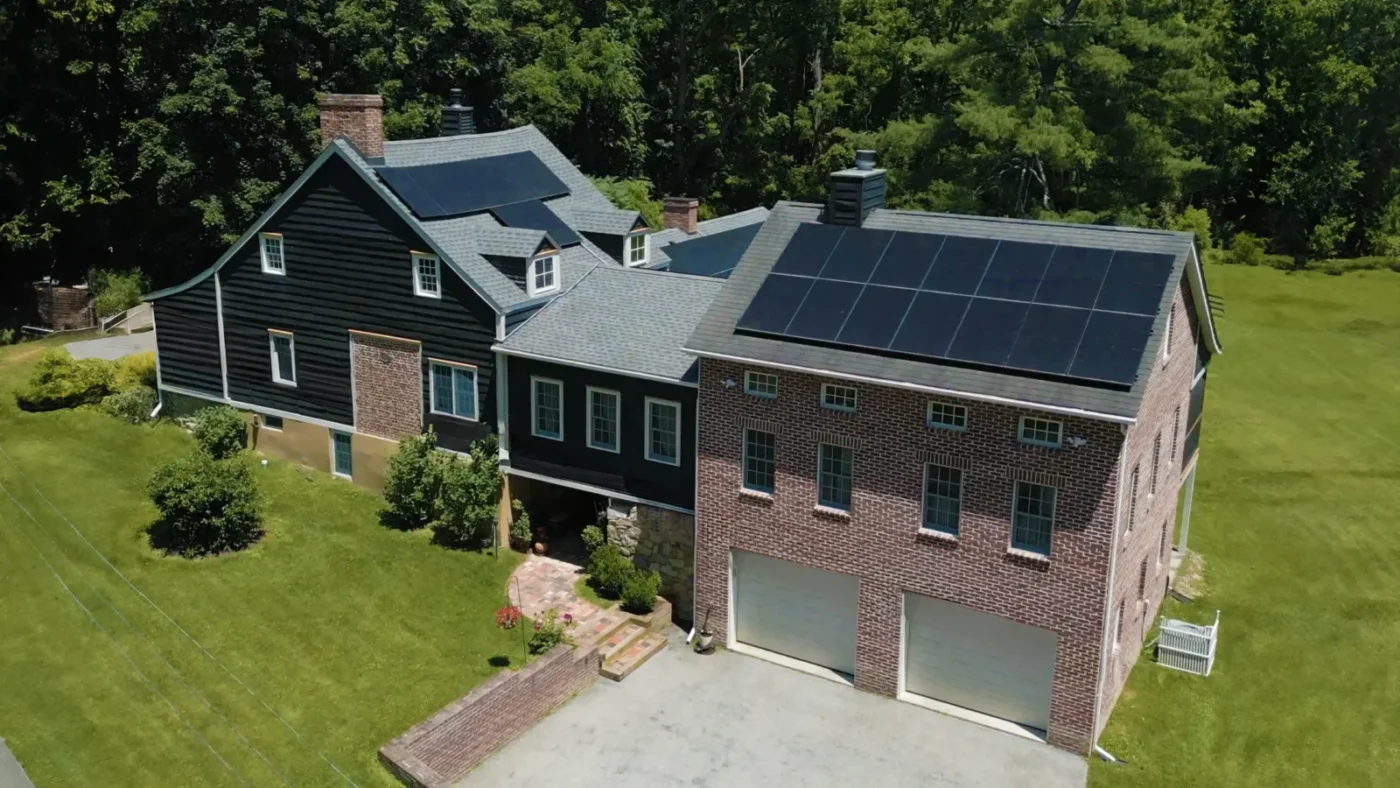With New York electricity rates rising more than ever, homeowners are turning to solar energy in record numbers. But do you actually need a battery to go solar? Before you decide to add a solar powered battery to your home, it’s important to know when they make sense as an investment and when adding a battery to your solar installation could end up being a mistake.
In this article, we’ll talk about when adding a battery to your solar panel installation is beneficial and clear up common misconceptions about battery technology.
Understanding Solar Energy: The Role of Net Metering
Before deciding whether battery storage is right for your home, it’s essential to understand how solar panels and the grid work together.
Daytime Production:
- Solar panels generate electricity during daylight hours, often producing more energy than your home is using at the time.
Nighttime Consumption:
- At night, your solar panels aren’t producing power, meaning you need to draw electricity from another source.
This is where net metering comes in.
Why Most Homeowners Don’t Need a Battery: Net Metering Explained
Net Metering is a billing mechanism that credits solar energy system owners for the electricity they add to the grid.
How it works:
- During the day your solar panels will often produce excess energy. That energy is sent to the grid and you’ll receive a 1:1 credit for every kWh your panels overproduce.
- At night or on cloudy days, when your system isn’t producing enough power, you can use those credits to offset the cost of the electricity you pull from the grid at 1:1 value.
In New York, Net Metering policies are extremely favorable, allowing homeowners to maximize their solar investments. This system effectively uses the grid as a virtual battery, balancing out your energy production and consumption over time.
It’s important to note that any excess energy produced during the day carries over to the next, and any surplus at the end of the month rolls over to the following month, allowing you to benefit from solar energy year round. Solar panels in New York often begin overproducing as early as March and continue generating excess energy through the summer and into early fall. This allows you to build energy credits during those months and use them in the winter when daylight hours are shorter.
Common Misconception: Do I Need a Battery to Power My Home at Night?
A common myth is that solar panel systems require batteries to supply power when the sun isn’t shining.
Reality Check:
✔ Net Metering makes batteries unnecessary for most homeowners because the grid acts like a virtual battery – storing and “returning” your excess solar energy when you need it.
✔ Instead of storing power in a battery, your excess energy is credited and used later, ensuring seamless energy usage.
Key Takeaway: For most homeowners in New York, you don’t need a battery to save money with solar.
So When Does Adding a Battery Make Sense?
While Net Metering addresses the gap between solar production and household energy use, there are specific scenarios where integrating a battery is advantageous:
- You Experience Frequent Power Outages: If you live in an area with frequent or prolonged power outages, a battery can provide a reliable backup power source, ensuring continuous operation of essential appliances.
- You Don’t Have Access to Net Metering: In regions without favorable Net Metering policies, storing excess solar energy in a battery for later use can be economically beneficial. But at this time New York is one of the most solar friendly states, offering 1:1 Net Metering.
- You Want To Avoid Time-of-Use (TOU) Rates: Some utility companies charge higher rates during peak demand periods. A battery allows you to store energy when rates are low and use it when rates are high, optimizing your energy costs.
- You Want Full Energy Independence: If you prefer total grid independence, a battery can help you rely entirely on solar power. However, achieving complete energy independence requires a large battery system, which can be very expensive.
Evaluating the Cost vs. Benefit of Battery Storage
Incorporating a battery storage system involves additional costs so it’s crucial to weigh these costs against the potential benefits:
- Initial Investment: Solar battery costs can vary greatly depending on capacity but prices generally start from as little as $7,000 which excludes installation and supporting hardware costs.
- Financial Incentives: Some regions offer tax credits, rebates, or other incentives for solar battery storage, which can help offset a significant portion of the initial investment.
- Long-Term Savings: While Net Metering provides immediate financial benefits, a battery system can offer additional savings in specific scenarios, such as avoiding high TOU rates or providing backup power during outages.
Alternative Solutions: Generators vs. Batteries
If your primary concern is keeping energy costs low while ensuring backup power during outages, adding a battery may not always be the best solution. For many homeowners, a backup generator can be a far more cost-effective and reliable alternative. Unlike a battery, which has a fixed storage capacity and can be depleted during extended outages, a generator can run as long as it has fuel. This is especially important in areas prone to severe weather, where solar production may be limited for days at a time. Once a home battery runs out of stored energy, it relies on solar panels to recharge, which may not be possible during storms, heavy snowfall, or multi-day blackouts.
Generators can provide a dependable power source in these situations, allowing homeowners to keep essential appliances running without worrying about depleting a battery. They can be fueled by propane, natural gas, or diesel, ensuring a continuous supply of electricity for as long as needed.
Additionally, backup generators typically have a lower upfront cost compared to a solar battery system, making them a more affordable solution for those who experience occasional outages but don’t require ongoing energy storage. While a solar battery can be useful in certain cases, such as homes with frequent grid instability, many homeowners find that a generator offers greater flexibility, reliability, and peace of mind at a fraction of the cost.
Solar vs. Generator Comparison
| Feature | Solar Battery | Backup Generator |
|---|---|---|
| Initial Cost | $10K – $20K+ | $3K – $8K |
| Lifespan | 10 – 15 years | 15 – 30 years |
| Power Supply | Limited storage (needs solar to recharge) | Runs indefinitely with fuel |
| Best For | Energy independence, TOU savings | Storm preparedness, long outages |
Conclusion: Is A Battery Right For Your Home?
Deciding whether to integrate a battery storage system with your solar panels depends on your unique circumstances and energy goals. In New York, where Net Metering policies are favorable, many homeowners find that a battery isn’t necessary to achieve energy savings and reliability. However, if you face frequent power outages, are subject to TOU rates, or desire greater energy independence, solar storage presents a compelling solution.
Before making a decision, assess your energy consumption patterns, local utility policies, and consider your financial goals.
Consulting with a reputable solar energy provider can provide personalized insights, ensuring that your investment aligns with your needs and delivers optimal benefits.


